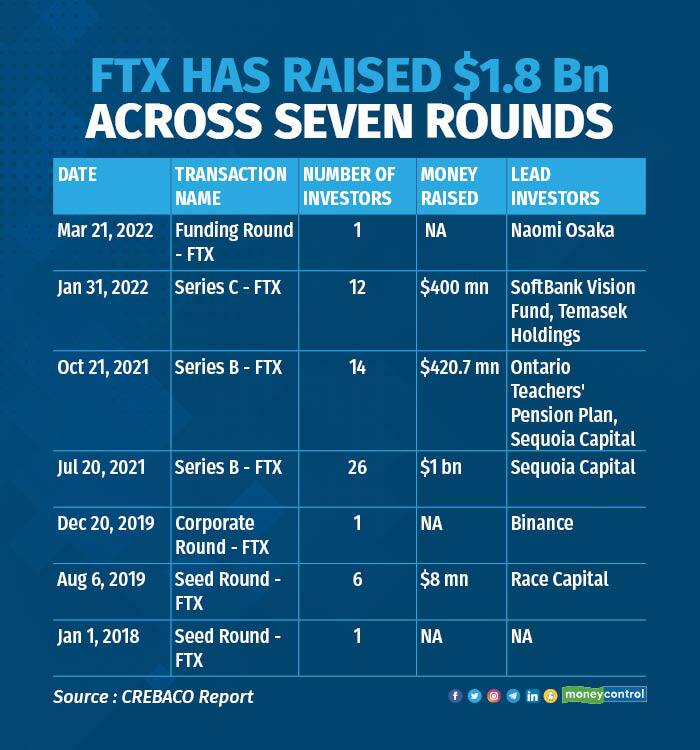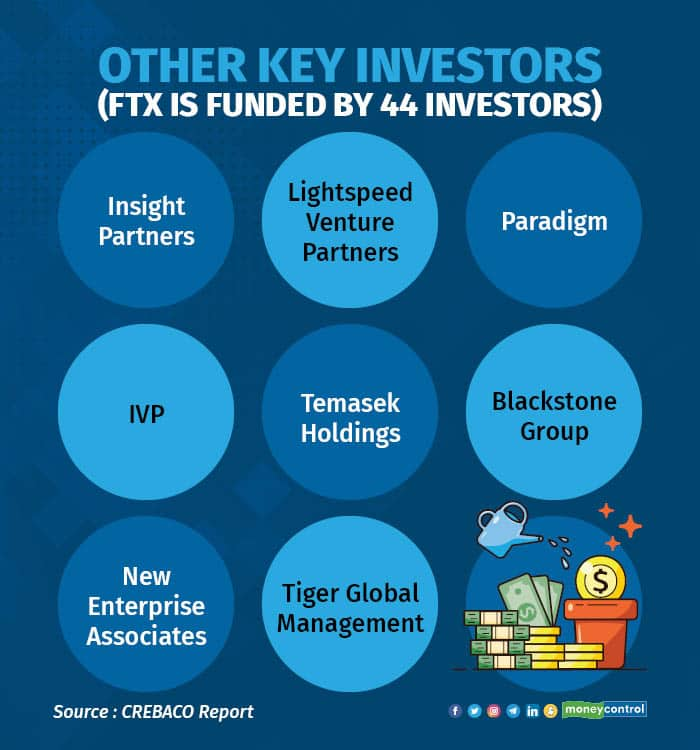
FTX Founder Sam Bankman-Fried
Up until a few days ago, Sam Bankman-Fried was seen as the messiah of the cryptocurrency sector.
But then came his crypto empire's epic fall. Known as the cryptocurrency wonderkid, he raced to build the world's third largest cryptocurrency exchange, FTX, in less than three years, outpacing former investor and now rival Binance.
Over the course of three years, the exchange grew to handle nearly 11% of the $2.4 trillion in derivatives traded globally each month, according to a report by crypto research firm CREBACO Global.
FTX's revenue grew by 1,000 percent to $1.02 billion in 2021 from $89 million in 2020, according to a CNBC report. During the same time period, Bankman-Fried became an influential figure in the US policy discussion surrounding the cryptocurrency sector, almost a messiah to his peers and investors in the sector.
As of September, FTX was trying to raise around $1 billion in funding at a valuation of $32 billion.
But don't be dazzled by the exchange's stellar financial performance just yet, because brand SBF is all about giving back to society for the greater good, while earning as much as he can to do so. To any fan of his, Bankman-Fried is the capitalist monk who stands by his altruism and vision.
But what happens when an industry's strong voice of reason goes wrong? Where does this leave investors and customers?
On November 11, FTX filed for Chapter 11 bankruptcy protection in the US. Bankman-Fried, too, resigned as CEO after his crypto empire came under scrutiny for its financial practices.
The man that is SBF
Bankman-Fried was born to lawyer parents on March 6, 1992, on the Stanford University campus — the pin code of at least 85 Nobel laureates in the past — and his life symbolically began in the place of greatness he was destined to achieve eventually.
He knew by the age of 20 that he wanted to make as much money as he could to donate to charities. Until 2017, Bankman-Fried worked as a trader for Jane Street Capital for nearly three and a half years, followed by a brief stint with the charitable organisation Centre for Effective Altruism. It was sometime in 2017 during the second job that he spotted a Kimchi Premium or a pricing anomaly between South Korean and US bitcoin prices, which he capitalised on, and he ended up not only making a lot of money but also gaining cult status in the cryptocurrency community.
In late 2017, he founded Alameda Research, a private trading and venture capital firm specialising in digital assets. A year later, he co-founded the FTX exchange with MIT alum Gary Wang.
When the king went rogue
The now 30-year-old crypto genius lives in his Robin Hood-like worldview, compares human memory to RAM (random access memory of computers), plays League of Legends during interviews, sleeps on a beanbag in his office, keeps a deck of cards to shuffle, and spins his brass rat (MIT class ring) when on the move.
“I'm (in)famous for playing League of Legends while on phone calls. I'll also try to avoid restarting my RAM if possible. One side advantage of the bean bags: if I sleep in the office, my mind stays in work mode, and I don't have to reload everything the next day,” Bankman-Fried wrote in a series of tweets about himself in February 2021.
A Bloomberg report from April 2022 noted that Bankman-Fried clearly views sleep as an unnecessary luxury and an activity that could cost him thousands of dollars while denying him the chance to save as many lives.
“The way Bankman-Fried’s peers describe him, he sounds like a strange sort of capitalist monk. One says he worked so hard in the early days that he rarely showered. Another says he swore off relationships because he doesn’t have time,” the report added.
 Bankman-Fried relaxing on his beanbag | Source : SBF's Twitter Handle
Bankman-Fried relaxing on his beanbag | Source : SBF's Twitter Handle2) Mostly I sleep on a beanbag, but I go back to my apartment now and then.
I jog back (some exercise is better than none!), and it gives me time alone with my thoughts and music.https://t.co/VeTafpRkb6
Today's thoughts:
Why do I play so much League of Legends?
— SBF (@SBF_FTX) February 4, 2021
His idea of monk-like capitalism was simple. He wanted to keep 1 percent of his earnings, or at least $100,000 per year, for a comfortable living while giving away every other dollar or bitcoin he earned for the greater good.
He leads what appears to be a simple life, driving a Toyota Corolla and, when not in the office, sleeping in an apartment or, as is the case now, a penthouse at the most luxurious resort on the Bahamas island, with 10 other roommates, according to a Bloomberg report.
“Yet he’s now part of the power structure that causes the problems he says he wants to fix. He makes big political contributions and pushes his company’s agenda in Washington. And so far he’s donated less to charity than he’s spent on naming rights for the Miami Heat’s arena (cost: $135 million over 19 years) and airing a Super Bowl ad with comedian Larry David portraying a curmudgeonly crypto skeptic (an estimated $30 million),” the report added.
Interestingly, he was also one of the major cryptocurrency donors in the US midterm elections. He was the second-largest donor to US President Joe Biden.
According to the CREBACO Global report, the founder of FTX has reportedly spent almost $40 million primarily supporting Democrats during the current election cycle.
Investors’ darling
As FTX's popularity grew, several prominent investors, including Sequoia Capital, SoftBank Group, Binance, Temasek, Tiger Global, and BlackRock Inc., sought a seat on its captable.
In fact, Sequoia Capital published a blog post on its website in September 2022 that was more of an ode to the genius of FTX and Bankman-Fried. The post recalled his first pitch to the partners for his start-up.
During his pitch, Bankman-Fried shared the ultimate vision for FTX - a super app in the making.
“I want FTX to be a place where you can do anything you want with your next dollar. You can buy bitcoin. You can send money in whatever currency to any friend anywhere in the world. You can buy a banana. You can do anything you want with your money from inside FTX,” he had said.
The chat window on Sequoia's side of the Zoom call suddenly lights up, with partners cheering, the blog post said.
“I LOVE THIS FOUNDER,” typed one partner.
“I am a 10 out of 10,” pinged another.
“YES!!!” exclaimed a third.
FTX has raised approximately $1.8 billion over seven funding rounds to date and has around 44 investors.


Going down the rabbit hole
Bankman-Fried spent last summer, flush with cash and a $1 billion earmarked for mergers and acquisitions, bailing out crypto companies that were selling for pennies. Embed Financial Technologies, Liquid, BlockFi, Bitvo, and Voyager Digital are among these bets.
FTX's fortunes changed when a CoinDesk report earlier this month revealed that the majority of Alameda Research's assets worth $14.6 billion on the balance sheet were in FTX's own FTT tokens.
Thus, the much-hyped crypto industry, which was already struggling in a bear market caused by inflation and recessionary pressures, began to spiral in a manner reminiscent of the dot-com crash.
Following this, on November 6, a public feud erupted on Twitter between one of its backers, Binance's founder and CEO Changpeng Zhao (CZ), and Bankman-Fried. As part of his post-exit risk management, CZ announced that Binance would sell off its entire portfolio of FTT tokens.
Binance was one of the first to support Bankman-vision Fried's and FTX. In 2019, the CZ-led exchange made an investment in FTX. The company then decided to exit FTX in 2021, selling its equity stake in a $900 million funding round at the time.
Binance still had $550 million in FTT tokens after the equity exit. Following CoinDesk's report on suspicious activity on the exchange, CZ wanted to steer clear of it.
“As part of Binance’s exit from FTX equity last year, Binance received roughly $2.1 billion USD equivalent in cash (BUSD and FTT). Due to recent revelations that have come to light, we have decided to liquidate any remaining FTT on our books,” CZ tweeted.
Following this, the FTT token began to crash on exchanges, resulting in a 20 percent drop by November 8. The following day, CZ announced that Binance will acquire FTX and has signed a non-binding letter of intent. The acquisition was to happen following exhaustive due diligence.
As a result, Bankman-Fried lost 94 percent of his fortune in a single day, totalling $991.5 million. According to Bloomberg, this is the "biggest wealth collapse of a billionaire ever in a single day."
“My main assumption is that if you are a crypto exchange facing a “significant liquidity crunch,” and you call up a bigger crypto exchange to ask for help, and you sign a deal for them to buy you the same day, then the price that they are paying you is, roughly speaking, zero,” Matt Levine wrote in his Bloomberg column following the announcement of the deal.
However, a day later, CZ's Binance pulled out of the deal, citing issues discovered in due diligence and news reports about "mishandled customer funds and alleged US agency investigations."
This served as a wake-up call for Bankman-Fried, who publicly apologised in a series of tweets. He also said that Alameda Research was winding down trading.
22) And, finally:
I sincerely apologize.
We'll keep sharing updates as we have them.
— SBF (@SBF_FTX) November 10, 2022
Sequoia Capital sent a note to its limited partners on November 9 declaring that it is writing down the entire value of its investment in FTX to $0, a portfolio company in which it had invested about $210 million last year across FTX.com and FTX.us. It even issued a disclaimer at the beginning of the blog post profiling Bankman-Fried, hours later the VC firm deleted the article.
Meanwhile, on November 11, crypto lender BlockFi - one of FTX's acquired companies - announced that it is suspending operations for the time being due to ongoing issues and clarification with Alameda and FTX.
FTX's FTT token has dropped 87.78 percent in the last few days, from $24.39 on November 6 to $2.98 as of 9:30 a.m. on November 11.
According to a Reuters report, SoftBank will also write down to zero its investment in FTX, where it has invested less than $100 million.
On November 11, FTX issued a press release announcing Bankman-Fried's resignation as CEO and the filing of bankruptcy proceedings for West Realm Shires Services Inc (FTX US), Alameda Research, and 130 other affiliated companies within the FTX Group.
“Cryptocurrency has a lot of speculative users. You haven’t seen a lot of serious retail investors or institutions come in and when large companies like FTX go rogue, retail investor confidence gets messed up. And now, institutions also can’t be trusted,” Sharan Nair, co-founder of Web3 firm Pyor told Moneycontrol earlier this week.
“In a Web 2 world if you are a large company CEO, one of the people you would be talking and taking advice from would have been SBF—even the senate and regulators also would be talking to someone like him to understand the industry. Now if he goes wrong, it’s a huge hit. Confidence in the system goes for a toss,” he added.Sam Bankman-Fried: The fall of the crypto king - Moneycontrol
Read More

No comments:
Post a Comment